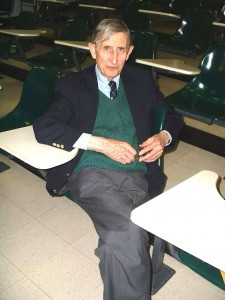
Freeman Dyson, seen here at Harvard, has never won the Nobel Prize. Running afoul of climate-change activists won't likely help on that front. (Image courtesy of Lumidek.)
The always-provocative smarties over at Edge held an event in Long Beach recently to herald “A New Age of Wonder,” as outlined by Freeman Dyson in his speeches and in an article in the New York Review of Books last August. The piece, “When Science and Poetry Were Friends,” is ostensibly a book review of Richard Holmes excellent science tome, The Age of Wonder: How the Romantic Generation Discovered the Beauty and Terror of Science.
But the 86-year-old Dyson also used the assignment to ponder whether we are at the advent of a new Romantic Age, one as reliant on biology and computers as the first was on chemistry and poetry. An excerpt from Dyson’s article:
“Richard Holmes’s history of the Age of Wonder raises an intriguing question about the present age. Is it possible that we are now entering a new Romantic Age, extending over the first half of the twenty-first century, with the technological billionaires of today playing roles similar to the enlightened aristocrats of the eighteenth century? It is too soon now to answer this question, but it is not too soon to begin examining the evidence. The evidence for a new Age of Wonder would be a shift backward in the culture of science, from organizations to individuals, from professionals to amateurs, from programs of research to works of art.
If the new Romantic Age is real, it will be centered on biology and computers, as the old one was centered on chemistry and poetry…If the dominant science in the new Age of Wonder is biology, then the dominant art form should be the design of genomes to create new varieties of animals and plants. This art form, using the new biotechnology creatively to enhance the ancient skills of plant and animal breeders, is still struggling to be born. It must struggle against cultural barriers as well as technical difficulties, against the myth of Frankenstein as well as the reality of genetic defects and deformities.
If this dream comes true, and the new art form emerges triumphant, then a new generation of artists, writing genomes as fluently as Blake and Byron wrote verses, might create an abundance of new flowers and fruit and trees and birds to enrich the ecology of our planet.”
Tags: Freeman Dyson, Richard Holmes
